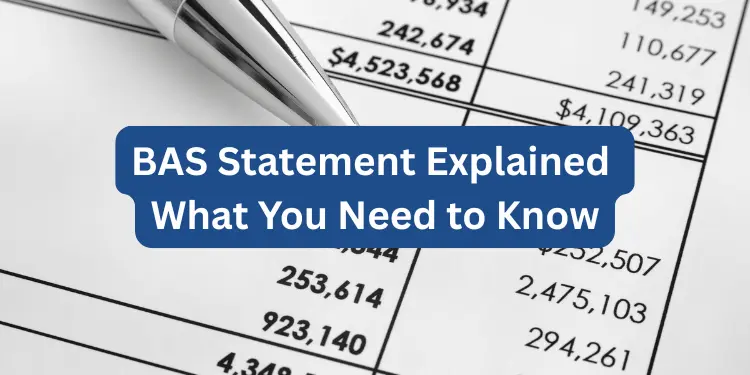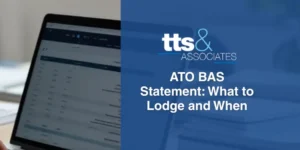If you’re running a business in Australia, you might have heard the term BAS statement thrown around. But what exactly is it? In simple terms, the BAS statement is a form that helps businesses report their tax obligations to the Australian Taxation Office (ATO). This includes things like Goods and Services Tax (GST) and Pay As You Go (PAYG) withholding. Understanding the BAS statement is key to keeping your business compliant and avoiding any nasty surprises come tax time.
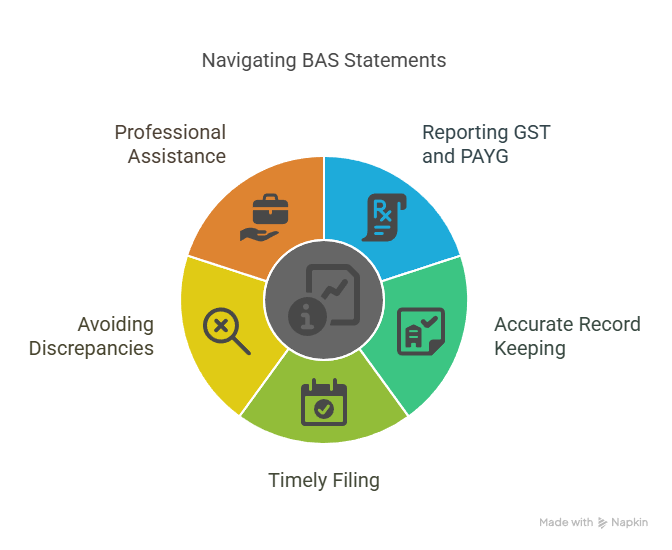
Key Takeaways
- A BAS statement is essential for reporting GST and PAYG to the ATO.
- It’s important for businesses to keep accurate records to fill out their BAS correctly.
- Filing your BAS on time helps avoid penalties and keeps your business running smoothly.
- Common issues include discrepancies in reporting, so double-check your figures.
- Consider getting professional help if you’re unsure about preparing your BAS.
Understanding The BAS Statement
Definition of BAS Statement
Okay, so what is a BAS statement? BAS stands for Business Activity Statement. It’s basically how you report your business taxes to the Australian Taxation Office (ATO). Think of it as a summary of all the tax stuff you’ve collected and paid during a specific period. It’s not just about GST; it covers a bunch of different tax obligations.
Purpose of BAS Statement
Why do we even need BAS statements? Well, the ATO uses them to keep track of how much GST and tax your business owes. It’s how they make sure everyone’s paying their fair share. The BAS statement helps you:
- Report and pay your Goods and Services Tax (GST).
- Complete the reporting and payment of your PAYG withholding tax.
- Report and pay other taxes like wine equalisation tax or luxury car tax, if applicable.
It’s all about keeping things transparent and organised when it comes to tax time.
Importance for Businesses
Why should you care about getting your BAS right? Here’s the deal:
- Compliance: First and foremost, it’s the law. You have to lodge your BAS on time to avoid penalties.
- Cash Flow: Accurate BAS reporting helps you manage your cash flow. You know how much you owe, so you can budget accordingly.
- Avoiding Audits: Messy or incorrect BAS statements can raise red flags with the ATO, potentially leading to an audit. Nobody wants that!
Basically, getting your BAS sorted is a key part of running a business smoothly in Australia. It’s not the most exciting task, but it’s super important.
Components Of A BAS Statement
Alright, so you’re staring at your BAS statement and wondering what all the fuss is about? Let’s break down the main bits you’ll find in there. It’s not as scary as it looks, promise!

GST Reporting
GST, or Goods and Services Tax, is probably the biggest part of your BAS. It’s the 10% tax added to most goods and services in Australia. You need to report how much GST you’ve collected from sales and how much GST you’ve paid on your business purchases. Here’s the lowdown:
- GST Collected (Sales): This is the total GST you’ve charged your customers.
- GST Paid (Purchases): This is the total GST you’ve paid on things you bought for your business.
- Net GST: This is the difference between the GST you collected and the GST you paid. If you collected more than you paid, you owe the ATO. If you paid more, you’ll get a refund.
PAYG Withholding
PAYG, or Pay As You Go withholding, is about the tax you withhold from your employees’ wages. You’re basically collecting tax on behalf of the ATO and then sending it to them. Here’s what you need to know:
- Gross Wages: The total amount you paid to your employees.
- Tax Withheld: The total amount of tax you withheld from their wages.
- Reporting: You need to report this amount on your BAS so the ATO knows you’ve paid the right amount.
Other Tax Obligations
Besides GST and PAYG, there might be other tax obligations you need to report on your BAS, depending on your business. These could include:
- PAYG Instalments: If you’re a sole trader or in a partnership, you might need to pay PAYG instalments. This is basically paying tax on your business income in advance.
- FBT (Fringe Benefits Tax): If you provide certain benefits to your employees (like a company car), you might need to pay FBT.
- Wine Equalisation Tax (WET): If you’re in the wine industry, you’ll need to report and pay WET.
- Luxury Car Tax (LCT): If you sell luxury cars, you’ll need to report and pay LCT.
Make sure you check which taxes apply to your business so you can report them correctly on your BAS. It’s always a good idea to double-check the ATO website or chat with an accountant if you’re not sure!
How To Prepare A BAS Statement
Preparing a BAS statement might seem daunting, but breaking it down into steps makes it much easier. Let’s walk through it together!
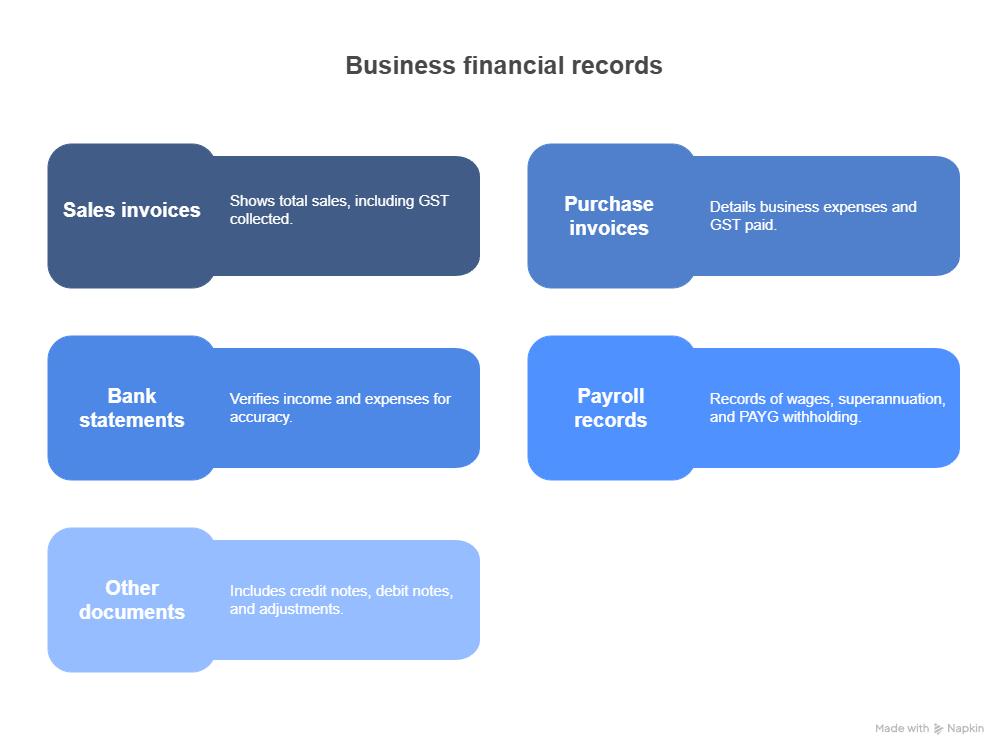
Gathering Necessary Information
First things first, you need to get all your ducks in a row. This means collecting all the relevant documents and records you’ll need to accurately complete your BAS. Here’s what you should gather:
- Sales invoices: These show your total sales for the period, including any GST you’ve collected.
- Purchase invoices: These detail your business expenses and any GST you’ve paid.
- Bank statements: These help verify your income and expenses.
- Payroll records: If you have employees, you’ll need records of their wages, superannuation contributions, and PAYG withholding.
- Other relevant documents: This could include things like credit notes, debit notes, and records of any adjustments you’ve made.
Filling Out The BAS Form
Okay, now for the fun part – actually filling out the BAS form! You can do this online through the ATO’s Business Portal or using accounting software. Here’s a general outline of the process:
- Identify your reporting period: Make sure you’re filling out the form for the correct period (e.g., monthly, quarterly).
- Calculate your GST: Work out the total GST you’ve collected from sales and the total GST you’ve paid on purchases. The difference between these two amounts is your net GST liability (or refund).
- Report your PAYG withholding: If you have employees, report the total amount of PAYG withholding you’ve deducted from their wages.
- Report other tax obligations: Depending on your business, you may need to report other tax obligations, such as fuel tax credits or luxury car tax.
- Review and lodge: Double-check all the information you’ve entered to make sure it’s accurate. Then, lodge your BAS by the due date.
Common Mistakes To Avoid
Everyone makes mistakes, but avoiding these common BAS errors can save you a lot of headaches:
- Incorrectly calculating GST: This is a big one! Make sure you’re using the correct GST rate (currently 10%) and that you’re only claiming GST on eligible purchases.
- Missing deadlines: Late lodgement can result in penalties, so mark those due dates in your calendar!
- Not keeping accurate records: Good record-keeping is essential for accurate BAS reporting. Keep all your invoices, receipts, and other relevant documents organised and easily accessible.
- Claiming ineligible expenses: Only claim GST on expenses that are directly related to your business. Personal expenses are a no-no.
- Forgetting to reconcile: Regularly reconcile your bank statements and accounting records to ensure everything matches up. This helps catch errors early on.
Filing Your BAS Statement
Okay, so you’ve prepped your BAS. Now comes the bit where you actually send it off to the ATO. Don’t stress, it’s pretty straightforward once you know the drill. Let’s break it down.
Due Dates and Frequency
First things first, deadlines! Missing these can lead to penalties, and nobody wants that. Here’s the lowdown:
- Most businesses lodge BAS statements quarterly. The due dates are usually the 28th day of the month following the end of the quarter (e.g., July-September BAS is due October 28th). Keep an eye on the ATO website, though, as these dates can sometimes shift slightly.
- Some businesses, depending on their GST turnover, might need to lodge monthly. The BAS due date for monthly lodgers is generally the 21st of the following month.
- If you’re lodging through a registered tax agent, you might get an extended deadline. Score!
Methods of Submission
Alright, you’ve got your BAS ready to go. Now, how do you actually send it to the ATO? You’ve got a few options:
- Online via the ATO’s Business Portal: This is probably the most common method. You’ll need an AUSkey or myGovID to log in.
- Through Standard Business Reporting (SBR)-enabled software: If you use accounting software like Xero or MYOB, you can usually lodge directly from there. It’s super convenient.
- Via a registered tax agent: They can lodge on your behalf, often with extended deadlines.
- By mail: Yes, snail mail is still an option, but it’s the slowest and least efficient. You’ll need to download the BAS form from the ATO website, fill it out, and post it in. Make sure you allow enough time for it to arrive before the deadline!
Consequences of Late Submission
Let’s be real, life happens, and sometimes things get missed. But try to avoid late BAS submissions if you can. The ATO doesn’t look too kindly on it.
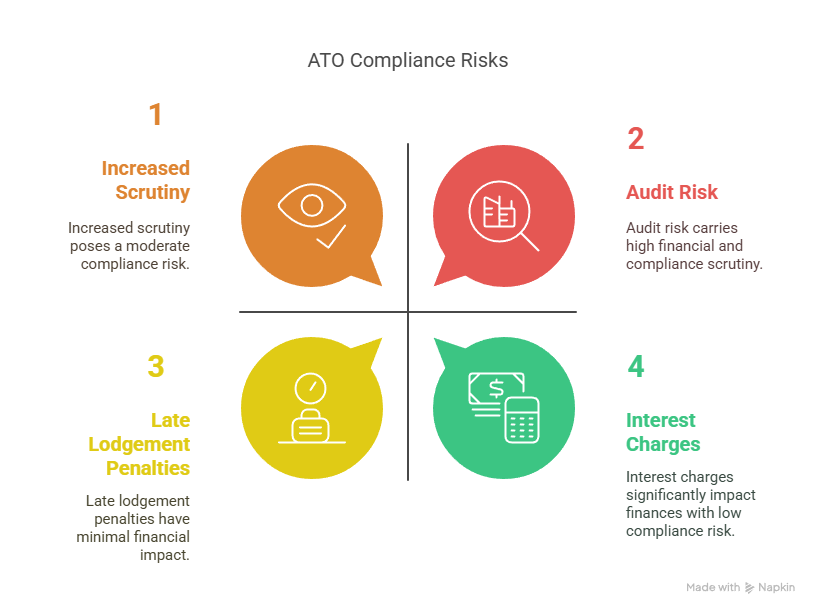
- Penalties: The ATO can charge penalties for late lodgement and payment. The penalty amount depends on how late you are and can be a percentage of the amount you owe.
- Interest charges: On top of penalties, you might also be charged interest on any unpaid tax.
- Increased scrutiny: Regularly missing deadlines could flag your business for closer attention from the ATO. Nobody wants an audit!
The best way to avoid these issues is to stay organised and lodge your BAS on time. Set reminders, use accounting software, or get a tax agent to help you out. Trust me, it’s worth it for the peace of mind.
Common Issues With BAS Statements
Discrepancies in Reporting
Okay, so you’ve lodged your BAS, and the ATO comes back with questions. It happens! Discrepancies in reporting are pretty common. This usually means something you’ve reported doesn’t quite match up with the ATO’s records or other information they have.
Here’s what might cause it:
- Simple data entry errors (we’ve all been there).
- Misunderstanding how to classify certain transactions.
- Differences in accounting methods (accrual vs. cash).
- Forgetting to include all income or expenses.
If you find yourself in this situation, don’t panic. The ATO will usually contact you to clarify. Review your records carefully, and be prepared to provide supporting documentation. It’s a good idea to keep good records in the first place.
Understanding ATO Audits
Nobody wants an ATO audit, but it’s a part of doing business. An audit is basically a review of your financial records to make sure you’re complying with tax laws. They can be random, or triggered by something specific in your BAS statements.
What to expect:
- You’ll receive a letter from the ATO outlining the scope of the audit.
- You’ll need to provide documents to support your claims (invoices, bank statements, etc.).
- The ATO might ask you questions about your business operations.
Key tip: Cooperate fully with the ATO. Being honest and transparent will make the process much smoother. If you’re unsure about something, seek professional advice.
Resolving Errors
Made a mistake on your BAS? Don’t sweat it. The important thing is to fix it as soon as possible. Here’s how:
- Identify the error: Figure out exactly what went wrong.
- Correct the error: Adjust your records accordingly.
- Lodge an amendment: You’ll need to submit an amended BAS to the ATO. You can usually do this online through the ATO portal or through your accounting software.
It’s always a good idea to keep a record of any errors you find and how you corrected them. This can be helpful if the ATO has any questions later on. And if you’re feeling overwhelmed, don’t hesitate to get help from a registered tax agent or accountant. They can guide you through the process and ensure you’re meeting your obligations. They can help you with BAS statements too.
Benefits Of Accurate BAS Reporting
Accurate BAS reporting? Yeah, it’s actually pretty important. It’s not just about keeping the taxman happy (though that’s a big part of it!). It can seriously help your business run smoother. Let’s look at some of the perks.
Improved Cash Flow Management
Cash flow is king, right? When your BAS is spot-on, you’ve got a much clearer picture of where your money’s going. No nasty surprises when it comes to tax time.
- Knowing your GST obligations helps you set aside the right amount.
- You can plan for PAYG instalments without scrambling at the last minute.
- This means you can invest in your business with confidence.
Better Tax Compliance
Look, nobody wants to deal with the ATO breathing down their neck. Accurate BAS reporting keeps you on the right side of the law. It shows you’re taking your tax obligations seriously. Plus, it reduces the risk of penalties and audits. Think of it as a shield against tax-related headaches. The BAS assists in reporting and paying various taxes.
- Avoid penalties for incorrect reporting.
- Reduce the likelihood of an ATO audit.
- Maintain a good relationship with the tax office.
Enhanced Business Insights
Your BAS isn’t just a tax form; it’s a goldmine of information about your business. When you’re meticulous with your reporting, you get a clearer view of your sales, expenses, and overall financial performance.
- Identify trends in your business.
- Make informed decisions about pricing and inventory.
- Track your business’s growth over time.
Seeking Professional Help With BAS Statements
Let’s be real, BAS statements can be a headache. Sometimes, you just need a bit of help from someone who knows their stuff. It’s like trying to assemble IKEA furniture without the instructions – possible, but probably not worth the stress! Knowing when to call in the pros can save you time, money, and a whole lot of frustration.
When To Consult An Accountant
So, when should you throw in the towel and get an accountant involved? Here are a few telltale signs:
- You’re drowning in paperwork: If you’re spending more time sorting receipts than actually running your business, it’s time. An accountant can help streamline your bookkeeping processes.
- Your business is growing: As your business gets bigger, so do your tax obligations. An accountant can help you navigate the complexities of GST, PAYG, and other taxes. Consider using expert BAS agent online services.
- You’re facing an ATO audit: An audit can be scary, but an accountant can act as your advocate and guide you through the process.
- You’re just plain confused: If you find yourself constantly scratching your head over tax jargon, don’t be afraid to ask for help. It’s better to be safe than sorry.
Choosing The Right Professional
Finding the right accountant is like finding the perfect pair of jeans – it takes a bit of searching, but it’s worth it in the end. Here’s what to look for:
- Experience with small businesses: Make sure they understand the unique challenges and opportunities that small businesses face.
- Relevant qualifications: Look for someone who is a registered tax agent and has experience with BAS statements.
- Good communication skills: You need someone who can explain complex tax concepts in plain English.
- A good fit for your business: Choose someone you feel comfortable working with and who understands your business goals.
Cost Considerations
Accountant fees can vary depending on their experience, location, and the complexity of your tax situation. Here’s a rough guide:
- Hourly rate: Some accountants charge an hourly rate, which can range from $150 to $500 or more.
- Fixed fee: Others offer a fixed fee for preparing and lodging your BAS statement. This can be a good option if you want to know exactly how much you’ll be paying.
- Value-based pricing: Some accountants offer value-based pricing, where they charge based on the value they bring to your business. Don’t be afraid to shop around and compare prices before making a decision. It’s an investment in your business’s financial health, so choose wisely!
If you’re feeling overwhelmed by your BAS statements, don’t worry! Getting help from a professional can make things much easier. Our team is ready to assist you with all your BAS needs. Visit our website today to learn more about how we can help you manage your statements effectively!
Wrapping It Up
In summary, understanding your BAS statement is pretty important for keeping your business on track. It’s not just about filling out forms; it’s about making sure you’re compliant with the ATO and managing your cash flow effectively. Whether you’re doing it yourself or getting help from an accountant, knowing the basics can save you a lot of hassle down the line. So, take the time to get familiar with it. If you’re ever unsure, don’t hesitate to reach out for help. After all, it’s better to ask questions now than to deal with issues later.
Frequently Asked Questions
What is a BAS statement?
A BAS statement, or Business Activity Statement, is a form that businesses in Australia use to report their tax obligations to the Australian Taxation Office (ATO). It helps businesses report goods and services tax (GST), pay-as-you-go (PAYG) withholding, and other taxes.
Why do I need to submit a BAS statement?
Submitting a BAS statement is important because it keeps you compliant with tax laws. It helps you report how much tax you have collected and how much you need to pay, ensuring you do not face penalties from the ATO.
How often do I need to file my BAS statement?
The frequency of filing your BAS statement can vary. Most businesses file quarterly, but some may need to file monthly or annually, depending on their turnover and tax obligations.
What happens if I submit my BAS late?
If you submit your BAS statement late, you may face penalties or interest charges from the ATO. It’s important to file on time to avoid these extra costs.
Can I get help with preparing my BAS statement?
Yes, many businesses seek help from accountants or tax professionals to prepare their BAS statements. They can provide guidance and ensure that everything is filled out correctly.
What are common mistakes to avoid when filing a BAS statement?
Some common mistakes include not keeping accurate records, miscalculating GST, and forgetting to include all income. Double-checking your figures and keeping good records can help avoid these issues.
